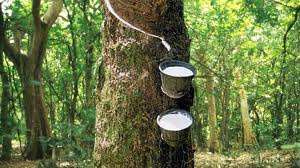The country is losing millions of cedis to the exportation of raw cup lumps (raw rubber) and action is required to realise the full benefits of the cash crop, Lionel Barre Managing Director of Ghana Rubber Estate Limited (GREL), has said.
“If the raw rubber is exported, those involve do not pay tax, minimal jobs are created, and communities remain underdeveloped. They are gradually destroying the rubber industry. We need to establish processing industries here,” Mr. Barre said.
Rubber is one of the most commonly used plant products in virtually every industry. However, the processing of raw rubber into various products in Ghana is virtually non-existent.
From aviation, health, education, sports to engineering, rubber is in high demand. Tyres, condoms, elastic bands, pencil erasers, boots, raincoats, rubber stamps and waterproof shoes to dishwashers and swimming caps, rubber actually finds its way into tens of thousands of different products.
The rubber latex is useful for a wide range of industries and products. It is used for adhesive, insulating, friction tape, crepe rubber used for footwear and insulating blanket. The rubber is also used in aviation tires, hose, and domestic clothes wringers to printing presses.
Rubber latex is used in the manufacture of articles such as cushions, balls, air hoses and balloons. Its ability to resist water and most fluid chemicals has resulted in its use in diving gear, rainwear and chemical and medicinal tubing. It is also used as a lining for railroad tank cars, storage tanks and processing equipment.
Cultivation of the crop is very popular in the Western Region. Rubber latex is extracted from rubber trees. The economic life period of rubber trees in plantations is estimated around 32 years with up to 7 years of immature phase and about 25 years of productive phase.
Mr. Barre announced that plans are far advance for the GREL to invest GH¢200million in a new factory for rubber production.
“The first phase of the project is expected to be operational in 2019 and the second and third phases will depend on quantity of rubber we produce in the subsequent years. The factory will be completed in 2028,” he said.
The company is also to expand its existing plantation. “Depending on the cycle of development, it will speed or slow our project and it is expected to employ more than 2,000 people, it is a good strategy for business in the region and the country as a whole” he said.
Thirty-six workers of the GREL received awards for being hardworking, committed and dedicated to the growth of the company.
They received rice cookers, gas stoves, motor bikes, table top fridge among others and certificates of honour and citation.
Madam Elizabeth Cobbinah and Madam Efua Nuamah of the production department of the company were adjudged best workers in the female category, while Edward Aggrey at the factory /stores unit received best worker in the male category.
Business News of Wednesday, 1 February 2017
Source: b&ft.com













